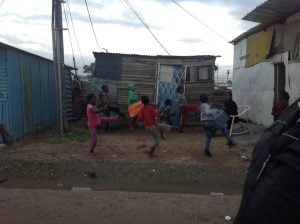Townships exist in every urban area of South Africa, and a version exists in most rural areas, too. Townships are the legacy of apartheid. Apartheid means “separateness” in Afrikaans. When segregation was forced because the Afrikaner government under the Nationalist Party believed that races could only thrive while separated (I can’t even begin to comment on this outrageously horrific idea), non-white citizens were forced into specified areas and couldn’t leave without passbooks…similar to passports but necessary for traveling outside the neighborhood.
Now the townships still exist, with vast overpopulation and poverty. BUT look at the joy and sense of community. As we walked through Vlei (“Swamp”) Township on the edge of Cape Town, these kids were dancing their hearts out. The oldest boy drummed with amazing skill on an old washtub. The mamas were busy cooking. Joy and hope and community have NOTHING to do with affluence.
We all know that the one thing that can break down prejudice is meeting a specific person from the group against which we hold a prejudice (Think about the movie American History X). Stories do the same thing. STORIES help us meet individual people, help us empathize, force us to understand oppression and misfortune; stories change our attitudes about “others.”
We believe that South Africa is a microcosm that is a metaphor for the world. South Africa is the site of one (not unlike the Holocaust) of the worst legalized systems of oppression in the world. There is racism of every type, and not only black/white conflict but between the “White tribes” (Afrikaners/Boers and English) themselves, East Indians, many other Asian groups, “colored,” and more. There is also some of the most joyful, colorful hope in the universe, despite oppression.
When “Madiba”–Nelson Rolihlahla Mandela retired from the South African presidency, President Clinton said the following:
“In every gnarly, knotted, distorted situation in the world where people are kept from becoming the best they can be, there is an apartheid of the heart. And if we really honor this stunning sacrifice of twenty-seven year, if we really rejoice in the infinite justice of seeing this man happily married in the autumn of his life, if we really are seeking some driven wisdom from the poser of his example, it will be to do whatever we can, however we can, wherever we can, to take the apartheid out of our own and others’ hearts.”
That’s why we read about South Africa. That’s why I like to teach about South Africa. That’s why I take students to South Africa–to present some opportunities to explore how learning about South Africa can help us all eliminate APARTHEID OF THE HEART.



Subscribe To Rebecca'sNewsletter
Join the mailing list to receive the latest news and updates from Rebecca.
You have Successfully Subscribed!